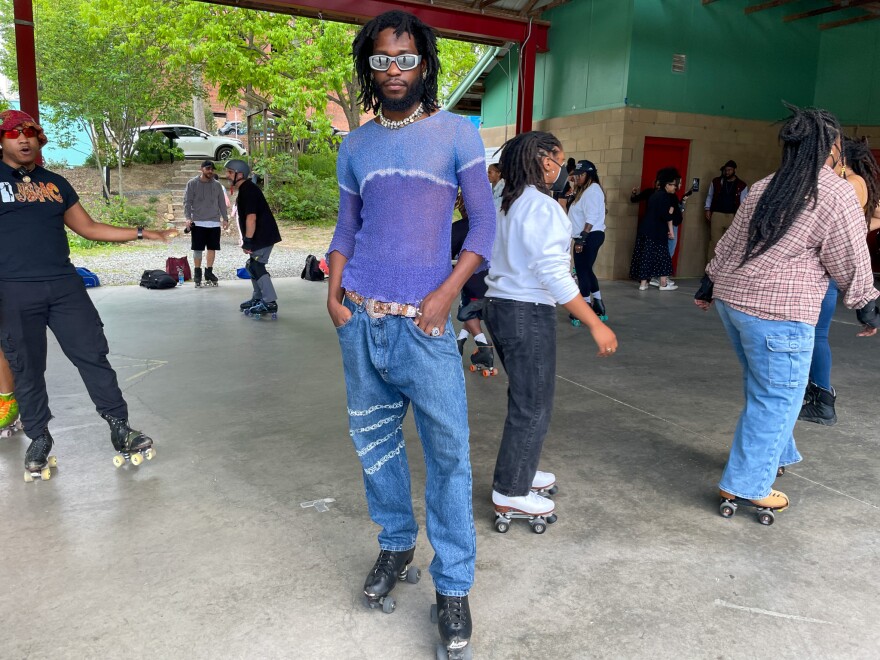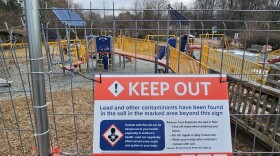At a skate party in Durham Central Park on April 26, dozens of skaters showed up to help inspire Triangle-area artist Dare Coulter, who is building a public art project for the Wheels Roller Skating Rink in east Durham.
Wheels Fun Park operated for nearly four decades, containing a play gym, go carts, a mini-golf course and other amusement park facilities in addition to a roller skating rink. Shortly after its closure in 2020, the city of Durham purchased it and announced plans to build a swimming pool. But a number of community members also demanded the reopening of the roller skating rink, which eventually led Durham Parks and Recreation to work on plans to renovate the rink.
The closure of Wheels followed the trend of closing roller skating rinks across the U.S., as documented by the film United Skates, which showed roller skating’s roots in civil rights history, and how the roller rinks have served as a vital gathering space for Black communities and for launching the careers for legendary hip-hop artists. In recent years, other rinks in North Carolina, such as Jellybeans in Cary and Kate’s Skating Rinks in Lowell, have also closed, leaving few places for skaters across the state to roll up.
Durham Parks and Recreation expects to reopen the rink this fall. WUNC spoke with Coulter and several skaters at the recent skate party in Durham to hear what the reopening of the Wheels Roller Skating Rink means to them.
Note: These interviews have been edited for brevity and clarity.
Dare Coulter
Can you talk about what motivated you to want to make this mural for Wheels?
It's not a mural — it’s actually going to be a giant sculpture. When people think of sculpture, they think of something that's 3D and round. But the piece that I'm making for Wheels will be more flat – it'll be essentially a flat piece that's actually 3D because it's a sculpture and it's going to span the whole length of the building.

Got it – since it was a pretty competitive process to win the contract for this public art project, can you talk about how much you wanted to do this project?
I've been to Wheels. People I know and love, love this place. It's a place that's really important to the community. Black culture has a lot of importance around skating rinks in general. And the fact that this one is coming back … typically when skating rinks close, they don't return. So [Wheels] is an exception. But also making public art that reflects the community and says, this is a space that is the community's — that's what I get to be a part of.
Some of what you just talked about was reflected in the documentary about roller skating rinks, “United Skates."
Yes, yes, yes! When people talk about life experiences, I think there are people who find it annoying that Black people talk about resilience and pushing through and overcoming so much. But the thing is, in the middle of the “United Skates,” they start talking about the part where there are violent fights at the skating rink because they're like, Black people can't have a place to skate. And I'm just like, you'll be sitting there, life is happy, here is joy, and then suddenly out of the blue, racism is still a part of it, right?
And so the idea that these spaces not only had to be fought for in the same way that swimming pools had to be fought for, in the same way that just existing and being happy in spaces had to be fought for. Roller skating rinks were no exception to that rule. In my understanding of Wheels as it was before, there were a lot of times where it was primarily a Black gathering space. And you know, there are people who talk about, they go to school, they go to Wheels and it's not even that they could necessarily afford to go to any of the camps, but they would just be there and there was safety, right?

So for me, it's also that the history overall of skating rinks says that this is a special thing that's worth protecting. When you see all these kids out here, you understand that this isn't just about right now. This is about 10 years into the future. This is about 20 years into the future. This is about more than just this moment because the people I know who are my friends who are in their thirties who grew up at Wheels, some of them have kids and their kids are gonna go there when it opens up.
What is your vision for the public art piece that you are making for Wheels?
That the people who have been here, the people who will be here, and the people who are here right now have something that tells them that this is a space of joy and love and celebration.
When I was a kid, my parents split and when we would go see my dad, he would take us to this place called Funsville. And it was this big part of my childhood, even though it was intermittent. But going to that place — when I got older, when we would go back, the colors were fading outside, right?

With the piece that I'm creating, there's a plan so that the piece can always be repainted and be colored and be vibrant and bright. Like I said, (skating rinks) close and they don't open back up. So there's resilience in the the space being here. But I want it to be a note that not only is this a place that's loved, but it's a place that matters to people, and I want them to feel that when they come to this place.
Do you skate yourself?
OK — I can rollerblade. And I can rollerblade really fast. That's all I got. I want to be able to do the (moves), I can't do them. But I want to, but I can't. I'm supposed to be learning, but I got deadlines. So I'm going to hopefully by the opening get my stuff together.
Sharon Mitchell, 58: [I’ve been skating] since the 70s. About 50 years. I've been skating probably since I was 7.
Are you excited for the reopening of the wheels?

I am because I have to go all the way to Raleigh when I want to skate. I'm excited about Wheels because I've been going there for years, and I'm glad they opened it back up. We thought they were going to tear it down and build some condos, but when I heard that they were opening it up, I'm excited about it.
What's your favorite memory of wheels?
They do lots of theme parties — 70s. So it's always good to dress up and go in there and just have a good time.
What does it mean to you to have the skating rink reopen in your community?
This right here (points to children skating). You see all these kids that showed up? They don't have anywhere to skate. All the kids would have something to do again.

Godric Graham, 30: I grew up on skates. I didn't grow up with money, but we always went to the skating rink. It was $5 every Saturday night. So it's a pastime that I think is timeless. No matter how old you get, you still want to skate. It brings people together so easily. And when you're out there, you want to skate with other people. You love seeing other people. You like seeing the dance moves. You like observing. And it's like no pressure though. I wish there were more events like this all the time.
Marissa Peterson, 32: Skating is one of my passions and I teach skate lessons. And I like skating with my friends, so I skate pretty often. I'm not from Durham, but I've heard countless stories (about Wheels) from various friends, whether it's a birthday party when they were young or like a disco sweat night. I'm just excited to be able to experience what people have been talking about.
Gideon Bueno, 31
I started skating with Bull City Roller Derby, which is the Durham Roller Derby League, in 2018. I had no idea what I was getting into when I got into it. It was the first time I found queer community, and I have not found another group since that has been as compassionate and intentional and affirming than that group. So my connection to skating and Wheels specifically is very personal. That’s where we used to practice. Monday nights, Saturday mornings. We would skate for a couple hours and then go to Motorco and have drinks or dinner. A lot of fond memories.
Can you share a favorite memory?
I miss speed practice. So, every Saturday morning, we would say, “Line up from fast to fastest,” and we would just do laps until you dropped off, essentially. But I have dreams about it now, where it's like, my heart is racing, and I just remember skating really fast with my friends.

How did it feel when Wheels closed?
Oh, it was devastating. I mean, there aren't a whole lot of places to skate in the Triangle. We had Jellybeans [in Cary]. Jellybeans closed during the pandemic. We still have United Skates, which is about 40 minutes away in Raleigh.
So you took part in the demonstrations to try and keep the rink.
When [our roller derby team] found out that the space is only gonna be for the aquatic center, we're like, don't do that. There's so few spaces where we can skate and play the sport. The city had no intention of keeping the rink until there was like a sizable contingency being like, “Please don't demolish this building. It means a lot to us.”
And so, I remember the specific day of the City Council meeting. It was June 6, 2021, where there were five or six of us from (Durham Roller Derby League) that went and talked to City Council, made our case. Other people from the community made their case. And for City Council, it was an easy win. They're like, yeah, why not? It doesn't have to be mutually exclusive. You can have both things. So eventually they came around, but it's been such a battle this whole time.







